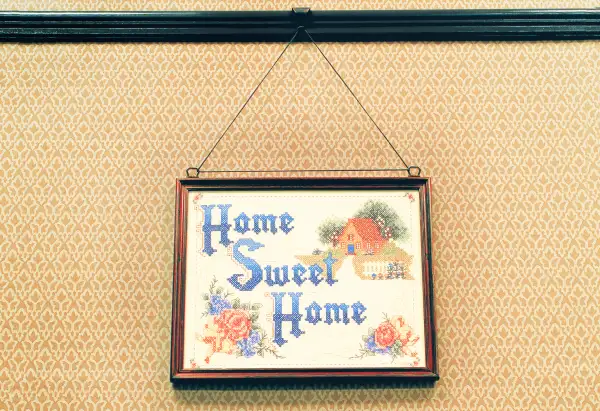How to Talk to Your Parents About Moving Out of Their Big, Beautiful House

This is part of a series of stories offering help with "Hot Topics" -- tricky family conversations that have real financial impact.
As your parents get older, chances are they're going to want to stay in their own homes, rather than move to a condo or retirement community -- most people do. But aging in place may not be a realistic option. What if one, or both, can no longer get up the stairs -- or drive to the store? If finances are tight, an expensive remodeling job, or a move closer to town, may not be possible.
It’s an awkward subject to bring up. But if you’re starting to worry about your parents, open the conversation now. The best time to make changes is well before a crisis happens.
PAIN POINT
Nearly 70% of households age 85 and over live in homes that lack essential features that would let them live safely, a 2015 study by the Joint Center for Housing Studies at Harvard found.
PREP WORK
Even if you have reason to worry about your mom or dad’s living situation, don't start by telling them what to do. “Your parents may not want to hear anything to the contrary from their children,” says Dianne McGraw, a geriatric care manager and president of the Aging Life Care Association.
Instead, offer to pitch in on other tasks that may give you a better picture of your parents' finances or living conditions: Ask if they could use some help with everyday tasks, such as bill paying or overseeing a home repair job. Greater involvement can open the door for further conversations -- and the more you're able to learn about their financial health, the better prepared you are to discuss their living options in concrete terms.
OPENING LINE
“I’ve always loved this house, and I know you do too. Is there anything I can help you with to keep it in good shape?”
Start by acknowledging your parents' feelings about their home. Take the time to reminisce about family gatherings and shared history before segueing into the physical and financial challenges of maintaining their home. “It will help to have suggestions about how you can make things easier for them,” says Rodney Harrell, director of livable communities at AARP -- whether tasks that you take over or simple modifications that will make their home safer.
TALKING POINTS
"You’re spending a lot of money to keep up your house, and you have a lot of equity in it. Have you thought about selling and using that cash to move somewhere more comfortable?”
Older adults with paid off mortgages, especially those living in high-cost areas, may have a lot of equity built up in their homes, says Vince DiLeva, a financial advisor in Redondo Beach, Calif. Many seniors could tap that equity by downsizing, perhaps to an easier-to-maintain condo or a continuing care retirement community that offers services they need.
If the notion of moving may not appeal to your mom and dad at first, offer to take them on a tour of retirement communities -- there may be one nearby where they already have friends. Look for options that feature activities that your parent enjoys -- communities that boast movies or restaurants within walking distance, for instance, or that make regular excursions to the theater.
“One major advantage of a retirement community is the ease of socializing,” says McGraw. “Seniors can make new friends and try out new activities, while they may end up isolated at home.”
–––
“The house may seem emptier now that the kids have gone. Have you thought about moving closer to us or to other family members?”
For many seniors, ties to family and community are what keep them in place. But if their children and grandchildren no longer live nearby, the resulting distance can pose challenges if the older person requires more assistance. So it may make sense for them to move closer.
Bring your mom and dad to your home for regular visits. While they're with you, check out nearby retirement communities and apartments, and have them meet your neighbors and see the local attractions. Once your town starts to seem familiar, your parent may feel more comfortable with the idea of a move -- and reluctant to leave the grandkids. “Although most of my clients prefer to stay where they are, many of those who moved did so to be closer to family,” says DiLeva.
–––
“After Aunt Sarah’s stroke, she had to move since she couldn’t handle the stairs. Have you thought about making some changes that could let you stay here longer?”
When you look at your parents' home, you're basically considering two phases: a period where they may want to simplify and scale back, and a time when they can no longer live independently and would need in-person help and perhaps a major retrofit. Only one-third of owner-occupied homes in the U.S. have basic accessibility features, like a no-step entry into the home and a bedroom and full bath on the first floor, according to Harvard's Joint Center for Housing Studies. Even fewer have such crucial features as a fully accessible kitchen or doorways wide enough to handle a wheelchair.
During the first phase, your family can make some relatively simple fixes -- putting grab bars in the bathroom, perhaps, or subbing in wall-to-wall carpet for slippery area rugs -- that can help them avoid the more costly consequences of a fall. The best time to get these upgrades into place is when everyone is still healthy and active, and small fixes will seem less overwhelming.
If your parents wait till a crisis occurs, like an illness or a fall, they could wind up spending more money for emergency retrofitting and additional care. Bigger projects -- such as installing a full bathroom and suite on the first floor of a house, or installing an elevator -- will likely cost tens of thousands of dollars. And if your parent stays at home, he or she may require home health aides, who charge $125 a day on average. That still may be cheaper than the alternatives, depending on whether a family member can step in and help. An assisted living facility averages $43,000 a year, while a nursing home might run $82,000, according to the 2016 Genworth Cost of Care survey. Check local costs before making any final decisions.
NEXT STEPS
The key is to have a plan for future care, wherever your parent ends up living. The more involved you can be with your mom and dad’s daily life now, and the more familiar you are with their finances, the easier it will be to provide the help they need. Be sure to enlist your siblings, as well, since they can help continue the discussion and share in any solution.
If your parents are reluctant to consider options, it may help to bring in a third-party expert -- a financial advisor, your parents’ doctor, or a geriatric care manager who is familiar with the services and retirement facilities in your parents' town. (Geriatric care managers with certain qualifications, including education and experience, are members of the Aging Life Care Association; a consultation will probably cost $100 to $300 an hour.) Your mom or dad may be more open to hearing about options from someone who can provide the inside scoop on different retirement centers, as well as how older people like them typically manage.
ONE FAMILY'S SOLUTION
McGraw, who is based in New Orleans, recently helped an elderly woman who refused to leave her home, even though she could no longer care for herself. “In our city, people rarely want to move out of their homes,” she says. The woman's daughter, who lived out of town, brought in McGraw to hire part-time private caregivers and coordinate their schedules. With that assistance, the parent has remained safely at home -- and the daughter doesn’t have to fly in frequently to keep tabs on her.
